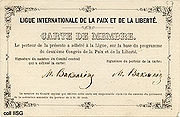
League of Peace and Freedom
Encyclopedia

Geneva
Geneva In the national languages of Switzerland the city is known as Genf , Ginevra and Genevra is the second-most-populous city in Switzerland and is the most populous city of Romandie, the French-speaking part of Switzerland...
. Emile Acollas
Emile Acollas
Emile Acollas was a French professor of Jurisprudence born in La Châtre, Indre.He was one of the founders of the League of Peace and Freedom set up in 1867. His call for the conference gained 10,000 adherents including Victor Hugo, John Stuart Mill, Elisée Reclus, Giuseppe Garibaldi, Louis Blanc...
set up the League’s Organising Committee which enlisted the support of John Stuart Mill
John Stuart Mill
John Stuart Mill was a British philosopher, economist and civil servant. An influential contributor to social theory, political theory, and political economy, his conception of liberty justified the freedom of the individual in opposition to unlimited state control. He was a proponent of...
, Elisée Reclus
Élisée Reclus
Élisée Reclus , also known as Jacques Élisée Reclus, was a renowned French geographer, writer and anarchist. He produced his 19-volume masterwork La Nouvelle Géographie universelle, la terre et les hommes , over a period of nearly 20 years...
and his brother Élie Reclus.
Other notable supporters included contemporary activists, revolutionaries and intellectuals such as Victor Hugo
Victor Hugo
Victor-Marie Hugo was a Frenchpoet, playwright, novelist, essayist, visual artist, statesman, human rights activist and exponent of the Romantic movement in France....
, Giuseppe Garibaldi
Giuseppe Garibaldi
Giuseppe Garibaldi was an Italian military and political figure. In his twenties, he joined the Carbonari Italian patriot revolutionaries, and fled Italy after a failed insurrection. Garibaldi took part in the War of the Farrapos and the Uruguayan Civil War leading the Italian Legion, and...
, Louis Blanc
Louis Blanc
Louis Jean Joseph Charles Blanc was a French politician and historian. A socialist who favored reforms, he called for the creation of cooperatives in order to guarantee employment for the urban poor....
, Edgar Quinet
Edgar Quinet
Edgar Quinet was a French historian and intellectual.-Early years:Born at Bourg-en-Bresse, in the département of Ain. His father, Jérôme Quinet, had been a commissary in the army, but being a strong republican and disgusted with Napoleon's 18 Brumaire coup, he gave up his post and devoted himself...
, Jules Favre
Jules Favre
Jules Claude Gabriel Favre was a French statesman. After the establishment of the Third Republic in September 1870, he became one of the leaders of the Opportunist Republicans faction.- Early life :...
and Alexander Herzen
Alexander Herzen
Aleksandr Ivanovich Herzen was a Russian pro-Western writer and thinker known as the "father of Russian socialism", and one of the main fathers of agrarian populism...
. Ten thousand people from across Europe signed petitions in support of the congress.
They also counted on the participation of the International Workingmen's Association
International Workingmen's Association
The International Workingmen's Association , sometimes called the First International, was an international organization which aimed at uniting a variety of different left-wing socialist, communist and anarchist political groups and trade union organizations that were based on the working class...
(IWMA), inviting the sections of the International and its leaders, including Karl Marx
Karl Marx
Karl Heinrich Marx was a German philosopher, economist, sociologist, historian, journalist, and revolutionary socialist. His ideas played a significant role in the development of social science and the socialist political movement...
, to attend the Congress. They decided to postpone the opening of the Congress until September 9, so as to enable delegates of the Lausanne Congress of the IWMA (to be held on September 2–8) to take part.
- While the balloting was going on, Citizen Marx called attention to the Peace Congress to be held in Geneva. He said: It was desirable that as many delegates as could make it convenient should attend the Peace Congress in their individual capacity; but that it would be injudicious to take part officially as representatives of the International Association. The International Working Men’s Congress was in itself a peace congress, as the union of the working classes of the different countries must ultimately make international wars impossible. If the promoters of the Geneva Peace Congress really understood the question at issue they ought to have joined the International Association.
(from The Bee-Hive
The Bee-Hive (journal)
The Bee-Hive was a trade unionist journal published weekly in the United Kingdom between 1861 and 1878.The Bee-Hive was established in 1861 by George Potter, with professional journalist George Troup as editor and Robert Hartwell as the main contributor...
Newspaper August 17, 1867, reporting on a meeting of the IWMA Central Council.)
The anarchist Mikhail Bakunin
Mikhail Bakunin
Mikhail Alexandrovich Bakunin was a well-known Russian revolutionary and theorist of collectivist anarchism. He has also often been called the father of anarchist theory in general. Bakunin grew up near Moscow, where he moved to study philosophy and began to read the French Encyclopedists,...
also played a prominent role in the Geneva Conference, and joined the Central Committee. The founding conference was attended by 6,000 people. As Bakunin rose to speak:
- "the cry passed from mouth to mouth: 'Bakunin!' Garibaldi, who was in the chair, stood up, advanced a few steps and embraced him. This solemn meeting of two old and tried warriors of the revolution produced an astonishing impression .... Everyone rose and there was a prolonged and enthusiastic clapping of hands"

